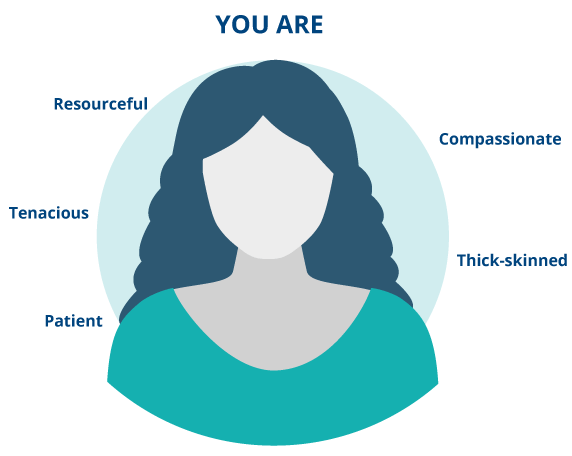Social Work: Degrees, Careers, Salaries & More
While everyone has the potential to help others through difficult situations, social workers provide an extra critical service to their communities. People in these roles interact directly with clients, helping others better their coping skills, improve their relationships, and find the resources they need to enhance the quality of their lives.
Contents
What Social Workers Do
The field of social work aims to improve the overall well-being of individuals, families, groups, and communities. Working directly with populations like the elderly, the poor, the incarcerated, the ill, and those with emotional or mental disorders, social workers seek to help their clients recognize and overcome their challenges. They address personal and group struggles, provide counseling services, and identify the treatments and programs that can help people improve their lives. They also act as advocates for social justice, working to increase health and happiness on the local and national levels through policy and system reform.
Careers in Social Work
There are many roles within the field of social work, and these can be tailored to address a variety of specialties such as public health, family counseling, substance abuse, criminal justice, and much more. Most of these roles require at least a bachelor’s degree, and depending on your state and employer, a master’s degree is often necessary.
Though you can practice social work without a license, you must do so under the supervision of a licensed clinical social worker (LCSW). If you wish to work in any position independently, you must become an LCSW yourself. Specific requirements vary by state, however gaining your license requires holding a master’s in social work, completing 2 years of supervised fieldwork, and passing the national exam.
Read on to learn more about what you can do with a social work degree.
Case management aide
A case management aide is often the first point of contact for a client seeking services from a social agency. In this position, you’ll perform tasks such as interviewing clients, inputting data, filing paperwork, scheduling appointments, and connecting clients with community resources.
A bachelor’s degree is all that’s needed for this role. However, since you’ll be interacting with a wide variety of clients, speaking a second language can make you more competitive in the field.
Substance abuse counselor
Substance abuse counselors work hands-on with people who are struggling with addiction. In this role, you’ll provide emotional support for your clients, help guide them through their treatment plans, and set them up with additional resources like rehab facilities and support groups.
A bachelor’s degree is often all that’s required to secure a position as a substance abuse counselor. But if you wish to work in private practice, you must have a master’s and earn your state-issued license.
Child and family social worker
As a child and family social worker, you could specialize in advocating for children in court, finding foster care placement, addressing behavioral issues in children, working through the effects of domestic violence, or guiding prospective parents through the adoption process. You might also work with teachers to coach them in ways to handle problems that could come up in their classrooms.
You’ll most likely need a master’s degree to work as a child and family social worker.
Criminal justice social worker
Working with people affected by crime, criminal justice social workers provide assistance that reduces the effects of crime and improves the overall safety of their community. In this role, you might help incarcerated or recently paroled people through rehabilitation by providing counseling, housing assistance, and other aid that aims to integrate them back into society. You might also work with victims to ensure they get the mental and emotional help they need to overcome the aftermath of an offense.
Though it’s possible to work as a correctional treatment specialist or probation officer with a bachelor’s degree, serving officially as a social worker will require a master’s.
Rehabilitation counselors
Rehabilitation counselors can be similar to recreational therapists, and may include speech therapists, though their focus is more on people with long-term physical, mental, and emotional disabilities, and their treatment methods are more traditional than creative. They work to help their patients live as independently as possible, teaching them techniques for managing physical, social, occupational, and other limitations. Common workplace settings include residential and nursing care facilities, as well as schools, state departments, and community centers.
Healthcare social worker
Healthcare social workers collaborate with medical professionals and patients during and following an illness or injury. In this position, you’ll work with patients to help them understand and cope with their diagnosis, incorporate necessary lifestyle changes, and refer them to resources like home health aides, therapists, and support groups. Within healthcare social work, you might concentrate on a certain setting or patient population. This can involve working directly in hospitals or with hospice care, or with specific groups like the elderly.
You’ll most likely need a master’s degree to act as a healthcare social worker.
School social worker
As a school social worker, you serve as an advocate for students, implementing strategies that assist in social development and academic success. Working alongside parents, teachers, and administrators, a school social worker might counsel students through issues such as bullying, behavioral issues, or problems they might be having at home that can affect their performance at school.
To work as a school social worker, you will need to hold at least a master’s degree.
How long does it take to become a social worker?
Entry-level social work jobs can be obtained with an associate’s degree and later, a 4-year bachelor’s degree, however your options will still be limited. If you wish to work independently, at a higher level, or within private practice, you’ll need to become licensed as an LCSW.
Gaining licensure requires a master’s degree in social work through a school that’s accredited by the Council on Social Work Education. Getting your master’s after a bachelor’s will likely take an additional 1–3 years, depending on how many credits you need to take and whether you’re attending on a full- or part-time basis.
You then need to complete at least 2 years of supervised fieldwork. Once you’ve completed these hours, you can sit for the exam administered by the Association of Social Work Boards (ASWB) and, if you pass, apply for an official license through your state.
What kind of places could you work?
Social workers are found in a variety of settings, including hospitals, mental health clinics, human service agencies, community organizations, settlement houses, correctional facilities, private practices, and educational institutions.
Skills You Need

Learn which personality traits and professional skills you’ll need to be a successful social worker.
You should have…
- Excellent goal-setting skills
- High ethical standards
- Integrity
- Clear boundaries
- Excellent communication skills
How to Become a Social Worker
As with many careers, becoming a social worker involves numerous steps—evaluating your goals and skills, earning your degree, and gaining license if you choose to advance your career.
1
Evaluate your skills
To be a successful social worker, you must possess certain abilities and traits. These include:
- Empathy for others
- The ability to assess emotions and behaviors
- Excellent communication skills
- A calm and supportive attitude
- High ethical standards
- The desire to work with people from all walks of life
2
Research careers and educational tracks
The educational track you take depends on your career goals. Entry-level positions may only require an associate’s or bachelor’s degree, though you’ll want to pursue a master’s if you
3
Get a degree
Earning your degree is a necessary step to finding the role you want within social work. Most who go into the field earn at least their master’s. Those who want to direct a social agency, teach at a university, or be a top-level policy advocate should consider pursuing a doctoral degree.
4
Get licensed
The ASWB offers licensing examinations for various education levels and experience. No matter which level you’re at, passing the exam can prove to future employers that you have the skills that are necessary to successfully perform your job.
That said, if you wish to work independently without supervision, you must become a licensed clinical social worker. To do so, you first need to hold at least a master’s degree in social work from an accredited school. Once you’ve graduated, you can take the following
- Contact your state licensing board to verify which test you need to take for your jurisdiction and request an application for a license.
- If your application is approved, you can then register for the appropriate exam through the ASWB.
- Make an appointment to take the exam. Beforehand, you can prepare by taking the online practice test.
- Bring 2 valid forms of ID on the day of your test. You will then be given 4 hours to answer 170 multiple-choice questions.
- At the end of your test, you’ll receive an unofficial score report, however your official results will be forwarded to your social work board within 2 weeks.
- If you pass the exam, you’ll receive your license from the board in the jurisdiction where you applied.
5
Find a job in social work
Joining a professional organization is not only a great way to network and stay up to date on information in the field, but it can also help you learn about job opportunities. Find job listings through organizations such as the National Association of Social Workers and the Clinical Social Work Association.
If want to work in a public agency, you can also research roles through the government website for your county. If you hold your license as an LCSW, you might instead opt to open your own private practice.
A number of factors influence whether a social worker should work in private practice or at an institution. Although private practice can offer flexibility, if you’re new to the field and lack a large patient base, you’ll need to work hard marketing yourself and getting referrals. Some states recommend getting two years of supervised experience before transitioning to private practice. Working at an institution may not offer the same flexibility as private practice, but you’ll likely gain valuable knowledge from colleagues and enjoy employer-paid benefits.
[Here’s a Complete Guide to Resources for Social Workers and Social Work Students]
Social Work Degree Types
Degrees in social work can be found at all levels, however, to work in any role above an assistant, you should hold at least a bachelor’s. You may find associate’s degree programs that focus on social work, but these should generally be used as just a stepping stone to earning an advanced degree.
Certificates and diplomas
Earning a community service, personal support, or child services certificate or diploma can be a great jumping-off point to starting your career. While it won’t open up many job opportunities, it could help you land entry-level roles such as a home health aide or an assistant in a group treatment facility. If you choose to pursue higher education, this experience could help you into the program of your choice and could possibly be applied to certain credits.
Bachelor’s degrees
A 4-year Bachelor of Social Work (BSW) degree prepares you to directly serve clients on the micro level, working with individuals to help them navigate difficult situations. Depending on your school, your degree may be a Bachelor of Arts (BA) or a Bachelor of Science (BS). Differences among these programs are few and frequently come down to any general education requirements dictated by the school. There might be just a slight difference in focus between degrees; for example, a BA might put more of an emphasis on counseling while a BS might more heavily highlight the science of behavior.
Evaluate the curriculum of each program you’re considering and select the one that offers classes that match your goals. Whether you choose a BA or a BS, a Bachelor of Social Work should prepare you for entry-level roles such as a case management assistant, substance abuse counselor, correctional treatment specialist, or residential counselor.
Master’s degrees
A Master of Social Work (MSW) is the logical degree to pursue if you want to work in a higher-level position. Like bachelor’s degrees, these programs are also split into a Master of Arts and a Master of Science. Again, few differences exist between these degrees. Both should prepare you to address issues involving welfare policy, psychopathology, social justice, and crisis intervention.
In a master’s program, you’ll also likely choose to specialize in a specific concentration, which can help you land the exact type of job you want in the future. Popular concentrations include:
- Children and youth
- Aging adults
- Marriage and family
- Mental health
- Substance abuse
- Hospice
Holding a master’s degree puts you on the path to earning your license and being legally allowed to practice without the supervision of a LCSW.
Doctoral degrees
Though a doctoral degree isn’t needed for most roles within social work, you might find it useful if you want to work as a researcher, administrative leader, or college-level educator. In these programs, you can learn how to conduct your own research to implement policy changes, serve at the executive level of a government agency, or instruct grad students on the best practices of the field.
Depending on your goals, you might choose a Doctor of Social Work (DSW) or a Doctor of Philosophy (PhD) degree. A DSW will put more emphasize on the practice and administration of social work programs, while the PhD will concentrate more on research and education.
Online & Accelerated Degree Options
There are many programs that offer social work degrees online, however, you’ll still need to complete your required number of fieldwork hours in person. You might also find a hybrid program, which combines mostly online classes with just 1 or 2 courses on campus per week.
Accelerated programs are also an option for people who want to earn their degree more quickly. These programs differ depending on the school but can involve applying credits for previous education or work experience, passing tests that waive the need for a certain course or taking intensives that let you earn your credits in less time.
The Council on Social Work Education (CSWE) accredits online and on-campus school programs. Their seal of approval is considered “specialized accreditation.” Institutional accreditation often comes from the Higher Learning Commission, which is divided into six regional associations.
Salaries and Job Growth
Social worker salary varies widely depending on the exact type of role you have, where you live, and the setting in which you work. That said, according to U.S. Bureau of Labor Statistics (BLS) 2023 data, social workers in general earn a median annual wage of $58,380. Those who work in community food and housing and emergency services earned less, while those in federal and local government facilities and agencies earned more.

$62,940
Healthcare Social Workers

$53,940
Family & School Social Workers

$55,960
Mental Health Social Workers

$63,770
All Other Social Workers
Through 2032, job opportunities for social workers are projected to increase by 7.4%, a rate that’s faster than the national average for all occupations.
Job Growth
7.4%
Is Financial Aid Available?
There are several different types of financial aid available for students seeking social work degrees. The first step is to fill out the Free Application for Federal Student (FAFSA), which the government uses to determine how much assistance you’re qualified to receive. This aid can come in the form of loans, grants, or work-study stipends. You can also apply for private loans through banks and other institutions.
You might also qualify to receive scholarships based on academic merit or other criteria. If you’re pursing an advanced degree, fellowships can be another great way to fund your education. Given to full-time graduate students, these financial awards may be short- or long-term and often come with additional stipends and benefits.
Are Social Workers Eligible for Student Loan Forgiveness?
There’s a number of forgiveness programs that can help you erase some of your loans, though you must meet certain criteria. Through the Public Service Loan Forgiveness program, it’s possible to relieve direct loans if you’ve made at least 10 years of payments and work full-time in a government or nonprofit agency. Many states also have their own loan forgiveness programs with their own individual requirements.
